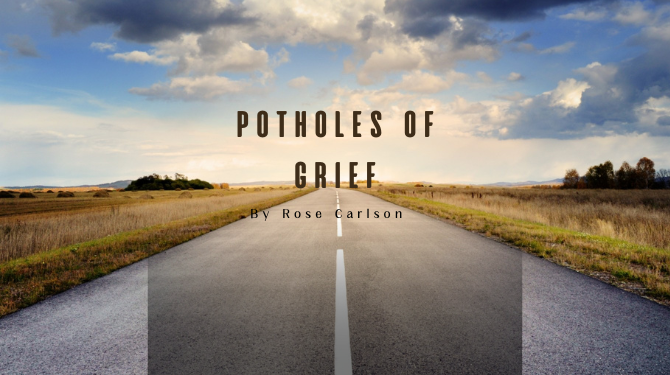
Potholes of Grief
By: Rose Carlson
One of the painful things about grief is there are a multitude of situations that can trigger heavy feelings that you don’t know what to do with, even months and years after your loss. Triggers can come from out of nowhere, and you do not always know what your triggers will be until you are confronted with them. Years ago, I read an essay about the potholes of grief, and I always think of that when I think of triggers. The author wrote how you can just be tooling along down the road when you suddenly hit a pothole, and she compared that to grief—you can be going about your days when out of the blue, a sudden jolt brings on fresh waves of grief and sadness.
Some triggers are universal, yet just as grief is different for everyone, so are triggers.
For instance, many moms who experience pregnancy loss feel immense heartbreak, as if the breath is being sucked out of them when they see pregnant women or babies. You may feel as if everywhere you go, there are happy, glowing pregnant mamas, making it difficult, especially in the early weeks and months, to go out in public. Your friends and family members might also have babies at the same time as you, and you may have a tough time being around them, even if you were once close. It can feel too hard on your tender heart. But sometimes, grieving moms are comforted and enjoy being around babies as it can give them hope for their future. They may focus on how precious life is, and while it is common to feel jealous of others who have what you wish for yourself, you may be able to celebrate your loved one’s new babies, too.
Other common triggers can be things such as:
- Hearing your baby’s name spoken when you are out in public. This can throw you off guard, especially the first time it happens.
- Approaching holidays and vacations. When you were pregnant, you likely dreamed about how you would spend your holidays and other meaningful times when your baby was here, and when they come, it is hard not to focus on what you are missing out on and what should be. Even if it has been many years and you have other children, the holidays can still feel like a harsh reminder of what you and your family have lost.
- Dates. Due dates and birthdays can be especially challenging as they are another reminder of what you are missing out on. In the early months, even a year or more, certain days and dates can be hard—every month on the day or date you found out your baby had died. Even the time of day can be triggering.
- Seasons. Perhaps fall reminds you of when you found out you were pregnant, or spring makes you long for taking walks with your baby in the sunshine. Or the snow falling may always remind you of the day your baby was born, and you watched the snow falling outside your hospital room window.
Other things that may be sudden reminders and spark fresh waves of grief:
- Music. A song may come on the radio that feels like a gut punch because of the memories it brings about.
- Milestones. When children in your family, especially those who are the same age as your child would be are taking part in religious milestone ceremonies like baptism, First Holy Communion, or Bar/Bat Mitzvahs, it can be painful.
- Seeing the school bus on the first day your child should be starting school.
- Certain smells. Maybe it’s flowers or the scent of lotion that reminds you of the time you spent with your baby.
- Symbols. Often, bereaved parents connect with symbols such as butterflies, ladybugs, angels, etc., and seeing those can generate fresh waves of grief.
- Social media posts. Facebook likes to share your memories, and it can feel jarring when you log on and see a memory you shared in the past of your baby shower, or announcing your pregnancy. It can also be triggering to see your friend’s posts that have to do with pregnancy or new babies.
Triggers as well as your reactions to them often change over time. The next time you drive down a street where you once hit a pothole, it may now be patched over, allowing you to drive over it without so much as a bump. The same thing can happen with the potholes of grief: Depending on what is going on in your life at the time, the same situation may not have nearly the same impact.
While experiencing triggering situations can make you feel out of sorts for a while and bring a surge of grief, they are usually not like the deep pit you may have found yourself unable to climb out of when your loss was new, fresh, and horribly painful. While potholes do hit you unaware, the pain they cause is usually short-lived, and they may not even be painful or negative. They may simply be memories that take you by surprise with their intensity.
What can you do with these triggers when they happen?
- First, it is important to acknowledge your feelings and recognize there are things that may always be challenging for you to deal with. Lean into them when they happen, and cry if you need to. Smile if they are positive memories. Know there is nothing wrong with anything you are feeling and know that triggers are common.
- Journal. Getting your thoughts on paper can help you figure out your feelings and what to do about them.
- Talk to a trusted friend or other loved one. If you have a therapist, he or she can also help you work through complex emotions as well as help you figure out ways to deal with these sudden reminders in the future. Share what happened with your partner. You may each have different triggers, and this is a good opportunity for you to open up to each other.
- Find ways to practice self-care. Go for a walk, make a cup of your favorite tea, and enjoy it while reading a good book. Bake a loaf of bread. Whatever works to calm your thoughts and help you feel settled, do those things whenever you need to.
- Take the time to do something to honor your baby. Create a new keepsake or purchase one. Start or add to a scrapbook. Perform a Random Act of Kindness. Start a collection of holiday ornaments that remind you of your baby. Take photos of your baby’s name and or keepsakes when you travel. Anything that honors this moment of thinking about your baby can help.
- Take a social media break if you think that will help.
- Some parents say they begin to look at unexpected triggers as signs their child is with them and always will be. They begin to find comfort in them. Look at them as your baby’s way of staying connected with you at that moment.
You may have many years of small bumps in the road of grief…many years of potholes, some bigger and more jolting than others, just as potholes on the highway are. You may have a hard time dealing with them and may wonder if something is wrong with you.
Stop wondering what is wrong with you (because nothing is!) and accept that there may always be situations that will come up and take you back in time. We would also love to hear about how you have handled triggers that come up for you.

About Rose Carlson
Rose is the Program Director at Share Pregnancy and Infant Loss Support. She came to Share in 2002 as a volunteer and eventually joined the staff in 2004. She has a BS in Psychology with a minor in Sociology. Her personal experience as a bereaved parent brings an invaluable perspective to her work. Rose manages the Share Memorial events, serves as an educator and is the Share Chapter coordinator.
